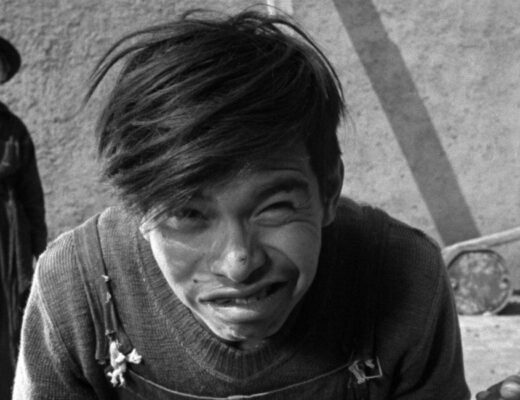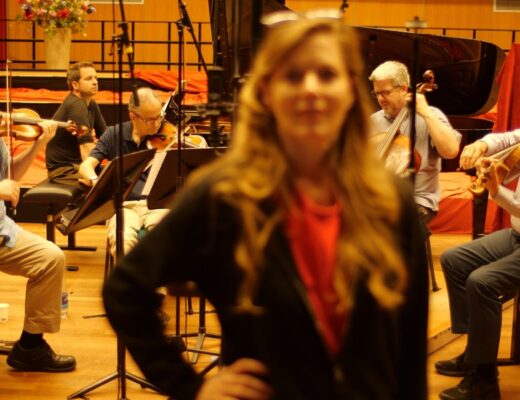The Wonder is undeniably lifted by the strength of its two leads and technical craft, despite a notable failure to satisfy all of Lelio’s ambitions.
Rarely when a film presents as self-aware of its artifice should you expect a straightforward ride. Sebastián Lelio’s latest, the period psychological drama The Wonder, begins with a view behind the mask. A detached voice introduces the film as the camera pans across an empty soundstage, with set elements in various stages of construction. These events are made up, the characters navigating these events are made up, yet the voice suggests that reality doesn’t need to derive its power from veracity to grip the mind. Narratives, the representative accounts we manufacture for ourselves, take on a life of their own. They warp truths and sometimes excavate the messy practicalities behind how this distortion functions as both a weapon and a survival mechanism. “We are nothing without stories,” says the voice, “and so we invite you to believe in this one.” The Wonder kicks off with a bit of metaphysical musing, daring the viewer from the first frames to steep themselves in the subtext as much as in the 19th-century setting. It’s a hefty opening note, promising a degree of intrigue that lands more superficially than likely intended. Still, that shouldn’t be held too much against it — across the board, The Wonder proves to be an engrossing effort.
In 1862, English nurse Lib Wright (Florence Pugh) travels to Ireland, the country still reeling from the Great Famine’s devastation. She’s come to a remote village to participate in the observation of the young Anna O’Donnell (Kila Lord Cassidy) and provide her qualified testimony at the assignment’s end. The girl hasn’t eaten in four months, a scientific impossibility that has led members of the community to dub her a “wonder.” Elizabeth is immediately skeptical and seeks to uncover the truth of the matter, forming an increasingly protective rapport with Anna as she watches her closely. She repeatedly combats hostility from other villagers, including Anna’s own mother, many of whom seem to be more invested in the miracle than any of the signs that something else could be afoot.
Pugh was one of the few attached to the star-crossed September spectacle Don’t Worry Darling who emerged from that slow-moving car crash virtually unscathed, if not newly bolstered and beloved. It’s nice to see her anchoring a project more worthy of her caliber, as her work here supplies the film with a well of pathos, her character Lib riddled with vulnerability beneath her stoic veneer. The subtleties of her dynamism are like muted fireworks, her moments of horror, confusion, and empathy manifesting the slippery surrealism the more frigid formal aspects suggest. Pugh excels at communicating this emotionally fraught blend well, embodying a sense of anguish that, when externalized, can make the viewing experience excruciating in the most delicately exquisite ways. The fullness of what Pugh brings pairs well with the stunned hollowness Cassidy imbues into Anna. Her performance could have easily been one-note, just affected eeriness serving as complement to the broader tone. Instead, it feels genuinely haunted, dramatizing how the burden of trauma can entomb the self underneath layers of pacifying performance until the person simply registers as a shell.
The Wonder owes much to the strength of its two leads. The film is undoubtedly effective, yet its cumulative effects don’t elevate it much beyond what it delivers at face value. The camera work is strong, finding impressive compositions within both the tight, dark domestic interiors and the beautifully dreadful Irish vistas. The sound design makes an immediate impression, opting for an ominous, melancholy, and slightly ecclesiastical palette to further drive home a sense of all-encompassing severity. As for the rest of the cast, they accomplish what they need to, their relative lack of memorability a product of their characters’ thinner characterizations. It can feel like some of them are essentially representative avatars of competing institutions, as much as the actors flesh them out once the narrative reveals its cards: Will Byrne (Tom Burke), the aggressively intrepid journalist; Dr. McBrearty, (Toby Jones) the narrowly determined man of science; several blindly faithful religious characters. Each establishment bears their own narrativizing capacities, invested in maintaining whatever purchase on the “truth” they can. Anything more than this acknowledgment is absent, and Lelio seems content with allowing the viewer to tease out more incisive conclusions themselves. But it’s adopting such a scrutinizing lens that works against his film, priming the viewer to analyze with a rigor that exhausts over time, especially as the film grows sluggish midway through. Most disappointingly, Lelio inconsistently leans into the weirdness that propels matters at the start. The meta touch is ultimately little more than that, a touch, embellishing the experience before losing its own thread. Falling short of satisfying all its ambitions, though, doesn’t ruin the strange power The Wonder often commands.
You can currently catch Sebastián Lelio’s The Wonder in theaters or streaming on Netflix beginning on November 16.







